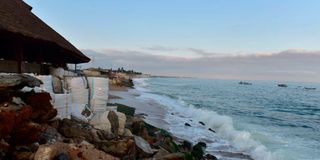Sea level rise due to climate change will displace 900 million people, UN says

This photograph taken on August 27, 2018, on the beach in Vridi, the industrial neighbourhood of Abidjan, shows the ruins of a hotel which was destroyed by the rise in sea levels.
Sea level rise due to climate change is likely to displace 900 million people globally, especially those living in low lying Coastlines, United Nations Secretary-General Antonio Guterres has said.
While addressing the security council last week, Mr Guterres said the sea level rise will risk people’s lives, limit access to water, food and healthcare, with mega cities in the world including Cairo, Lagos, Maputo, Bangkok, Dhaka, Jakarta, Mumbai, Shanghai, Copenhagen, London, Los Angeles, New York, Buenos Aires and Santiago facing serious impact.
He pointed out that some communities are already suffering the effects of sea level rise, including destruction of livelihoods dependent on agriculture and tourism in Caribbean.
In west Africa, flooding and coastal erosion has damaged infrastructure and displaced communities, while in North Africa, intrusion of saltwater has contaminated land and freshwater resources and destroyed livelihoods dependent on them.
“Many low-lying communities and entire countries could disappear forever. We would witness a mass exodus of entire populations on a biblical scale”, said Guterres, adding that this could lead to a “fierce competition for fresh water, land and other resources.”
Quoting data from the World Meteorological Organisation, Guterres said that global sea levels have risen rapidly since 1900 as compared to any preceding century in the last 3,000 years.
The global ocean, he added, has also warmed faster 9in the last 100 years, then it has in the last 11,000 years.
Sea level is caused primarily by water from melting ice sheets and glaciers, and expansion of water because of warming. With the earth’s global temperature having risen by 1.5 degrees Celsius, the world is staring at a disaster should the temperatures keep rising.
While calling on support for developing countries to build resilience against the effects pf climate change, Guterres also urged developed countries to pay up their $100 billion finance commitment to help developing countries survive the effects of climate change.
“The international community must address the legal and human rights impact of rising seas and shrinking landmasses. This means not only international refugee law, but also innovative legal and practical solutions to forced human displacement. People’s human rights do not disappear because their homes do,” said Guterres.
Closer home, in Kenya, a 2021 country climate risk profile by the World Bank explains that Kwale, Mombasa, Kilifi, Tana River and Lamu counties are at risk of sea level rise, which, when combined with extreme weather events, is likely to lead to flooding.
“The coastal city of Mombasa is particularly exposed, with an estimated area of between four and six square kilometres likely to be submerged with a rise in sea level of only 0.3 metres. In other coastal locations, sea level rise is likely to render more acute the current water supply and salinisation problems, as freshwater aquifers are contaminated with saline water. Waterlogging of soils and the resulting salt stress might reduce crop production,” says the World Bank.
Additionally, the health of coastal populations is at risk as saline intrusion affects coastal aquifers, and the permanent inundation of low-lying areas renders them uninhabitable.
Kenya’s broader economy is also at risk from rising seas as coastal and marine resources, all critical to economic development through tourism, fisheries, shipping and port activities, suffer.
Rising sea levels will likely lead to damage and destruction of infrastructure, including ship docking ports and industries located in the coast if no adaptation strategies are implemented.
“The agriculture sector along the coast will also be impacted, with the loss of income of at least Sh47 billion as exported mango, cashew nut and coconut harvests will be affected by a one-metre sea level rise,” the report adds.





